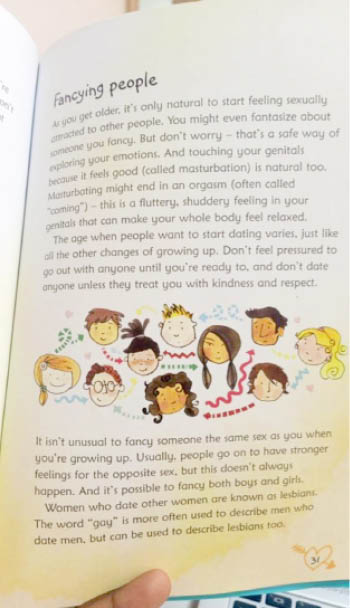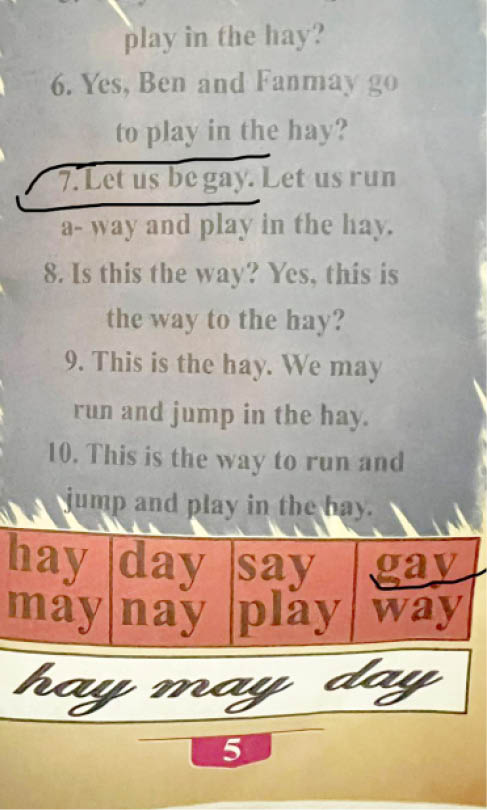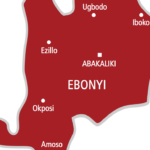Parents and clerics have expressed disgust over the gradual but deliberate insertion of same-gender themes in children’s educational and entertainment materials, Daily Trust Saturday reports.
They said this trend was contrary to the religious and cultural beliefs of most Nigerians because it is seriously eroding social values among millions of children exposed to corrupt content.
Our correspondents report that many cartoons, short films, books and other instructional materials, have been adulterated recently, even as children are being exposed to them.
Some parents, therefore, called on relevant authorities, including film sensor boards at the federal and state levels, the National Broadcasting Commission (NBC) and the Federal Ministry of Education, among others, to take urgent action and tame the negative trend.
- BREAKING: Matawalle orders arrest of those rejecting old naira notes
- Why I converted to Islam – Canadian rapper Jae Deen
While many western countries still have not embraced same-gender content majority of African countries are against it, but many of the foreign content is slipping into many homes and schools.
The trend is very much contested in western countries and many people are against it. In fact, this was the centrepiece of Trump’s speech when he declared to run for the 2024 presidency last year.
According to NBC News, former President, Donald Trump vowed that, if he is re-elected, he will punish doctors who provide gender-affirming care to minors and push schools to “promote positive education about the nuclear family” and “the roles of mothers and fathers” as part of a wide-ranging set of policies to use federal power to target transgender people.
Daily Trust Saturday gathered that the preponderance of such contents are in private schools that have limited surveillance by government agencies.
Moves to protect Nigeria’s values
In Nigeria, for instance, former President Goodluck Jonathan, on January 7, 2014, signed into law, the Same-gender Marriage Prohibition bill (SSMPA) even as violating its provision attracts between 10 and 14 years of a prison sentence.
Yet, despite the prohibition and penalty, same-gender relationships and contents are gradually on the increase across media platforms and becoming the norm, and now for children too.
Endless examples
When the animated series, ‘The Legend of Korra’ ended its three-season run with the two heroines holding hands and dissolving into a mist – thus making explicit a lesbian love interest that hitherto had only been hinted at, many parents, teachers and clerics condemned the outcome, saying that children’s television programming had been grossly violated.
Other examples include the 2012-2013 season of “gender-bending”, an Australian cartoon series, SheZow, featuring “a 12-year-old boy who finds a ‘power ring’ that turns him into a girl,” and an episode in Disney Channel’s children’s series ‘Good Luck Charlie’ in which “a lesbian couple brings their child over for a play date.”
Recently, some parents have taken to social media to share their discovery of contents and words found in their children’s books, which they disagreed with as it is not religiously, morally and culturally acceptable in this part of society.

Moral corruption in schools
A mother who does not want to be mentioned raised the alarm to advise other mothers to devote time to go through their children’s books and activities in school.
She said, “I was helping my child with her homework. Queen Primer is a book they give children in school to help them learn how to read by identifying words that sound alike. I came across this part, ‘Let us be gay.’ I know that gay means happy too but it just did not sit well with me. So, I complained to the school and they said that in this context, it means happy.”
But she insisted that she was not comfortable with the explanation, and after some argument, they used correction fluid to clean it for all the pupils in the class.
“I feel pupils at this age are curious and adventurous, so when we start exposing them to such things they may want to do it, just to experiment. I honestly don’t think five-year-olds should be exposed to such words,” she said.
Though gay could mean carefree, showy or cheerful, the popular acceptable meaning is a sexually or romantically attracted exclusively to people of one’s own sex or gender (used especially of a man).
For parents like Mrs Aliyu, a mother of a 2-year-old girl attending daycare in Kano, the increase in same-gender themes in children’s media content is not a welcome development.
“I am very concerned. I found out that some of these cartoons have same-gender parents and even some books too,” she said.
Like other mothers spoken to, Mrs Aliyu said she would now watch everything before exposing her children to them. “If I notice anything off, that’s the end of watching that cartoon in my house,” she added.
A mother of two kids in primaries 3 and 5, Mrs Amina Jalal, said she had to introduce a no-television policy at home to prevent her children from watching such content.
“This homosexuality is really rampant now. They used to watch cartoons, but not anymore. I now run a no-television policy. And the phone they have is not internet-enabled. When they are a bit older I will try to explain everything to them – that God created man and woman for a reason,” she said.
Hajiya Fatima Hashim said it was sad that same-gender representation in the media targeted at children had become a growing trend, lamenting that it would shape their beliefs and perceptions about what is “normal.”
She said, “They say you should take your children to school for a brighter future, but now, it is like if you take your kids to some western-oriented schools, you are doomed. I gave birth to my children, so why should someone out of nowhere insist on shaping them against my belief?”
She wondered why it seems the government is not bothered “with what is being smuggled to our future leaders’ schools.”
Also, a social media user shared a page of a book later found to be titled, “What’s happening to me?” by Susan Meredith, using it to advise parents to be vigilant of book content for their children.
A part of the page reads: “It is not unusual to fancy someone of the same gender when you are growing up. Usually, people go on to have stronger feelings for the opposite gender, but this doesn’t always happen.
“And it is possible to fancy both boys and girls. Women who date other women are known as lesbians. The word “gay” is more often used to describe men who date men, but it can be used to describe lesbians too.”
While this book is not by a Nigerian author, the question remains how such books get into the country and who checkmates the contents, a blogger, Michael Oji observed.
We’re watchful – Teachers
A teacher in Kano who pleaded anonymity told Daily Trust Saturday that the only cartoon they allow children to watch during school hours is phonics-related.
“What we normally do in our school is using the television to teach oral English and watch educational programmes and documentaries. What the children watch will be watched by at least two teachers before it is played to the children,” she said.
She said she had also heard about the books but her school “thoroughly scrutinises books before recommending and using them for pupils.”
The chairman of Voyage International Schools, Abuja, Yussuff Oriyomi, told Daily Trust Saturday that the federal government, through the Nigerian Educational Research and Development Council (NERDC) and other agencies prepares the curriculum for schools and recommends Nigerian-authored books.
He, however, said some schools would bring in some foreign-authored books to expand their teaching resources.
On Queen’s Primer’s “Let Us Be Gay,” he said most schools would use it in the early years to deepen reading, but he was not sure if it’s an approved book.
He explained that teachers had the responsibility to explain the meaning in the context of the original meaning of the word and carefully guide the learners through appropriate understanding.
On the content of “What’s Happening to Me,” he said it was not appropriate for children of less than 12 years, but, “Teachers and parents must start having these discussions with their wards to ensure they gain appropriate understanding according to our moral values.
“If we don’t explain and clarify these things to them in the light of our moral values, the cartoons and movies are there to teach them wrongly. We train our teachers/parents to spot that. They have to be watchful and read before our pupils read.
“We train our teachers/parents on how to explain these topics in a manner the children will decipher. We must let children know the worldview of others about these topics and let them know our moral world about them and why our view is better and Godly. We need to be strong in spiritual/moral education and practise what we preach. Cartoons, movies etc are replete with these messages. We need to screen them,” Oriyomi said.
On his part, Dr Shuaibu Doury, a Kano-based cleric, said same-gender “is one of the rare issues that Nigerians, regardless of cultural and religious differences, are unanimous against.
“Both Islam and Christianity, the two dominant religions in the country condemn it as sinful and destructive to social morality.”
He said parents and teachers must therefore rise up to their responsibilities and protect their children from anything that promotes immoral behaviours.
“It is wrong for parents to assume that all cartoons are harmless. They should scrutinise the content of every episode before allowing their children to watch them, or alternatively, watch along with them in order to make interventions where necessary. If teachers are given such content to teach, they should draw the attention of the school authorities. I would also like to see parents and teachers (in collaboration with religious leaders) coming together to advocate the enactment of laws that will safeguard the morality of our children.
“There are definitely more gay and transgender characters and stories in children’s television in Nigeria. It is not just cartoons, it includes modern textbooks. And it will get worse in the future as some foreigners have decided that same-gender marriage is a ‘constitutional right. We just have to talk with them to protect them.”
Regulators speak
The Kano State Censorship Board is the organisation responsible for guiding and monitoring all facets of arts in order for them to be instructive to the public and free of any unwanted moral contamination.
The executive secretary of the board, Ismail, Na’Abba Afakallah, said the state government would not hesitate to punish any film producer who produces obscene or indecent movies capable of corrupting the minds of children and the youth.
He said Kano film practitioners abided by the rules and regulations of the board.
“Our local producers, particularly those who produce and release series, have mostly been censored and approved by the board. Unlike before, we do not allow cross-dressing to be portrayed as a good thing in any local movie, let alone employing their services as actors because it is against our religion.
“Those who bypass such laws are from states where we have no jurisdiction.
“I will use this medium to call on parents and guardians to be wary of what they watch with their children,” he said.
Reacting, the immediate past chairman of the Federal Capital Territory (FCT) chapter of the National Association of Proprietors of Private Schools (NAPPS), Olusola Bankole, said it’s not new, adding that it has been going on for a while.
She said that some time ago, they protested against Comprehensive Sexuality Education smuggled into curricula used in Nigerian secondary schools, which was being pushed by the United Nations Development Programme (UNDP) and some people in the NERDC.
“At that time, some accepted it but some of us said no. They brought it back last year, treated it and changed it to Family Life Health Education, but some of the contents were very tricky as the curriculum will teach our children to be rebellious. They said they wanted children to be able to speak up for themselves; they want to teach children to know about their bodies, and that if they were not comfortable about their bodies they should speak up.
“We are concerned because some of the recommended books in 2016 had watermarks, and until you photocopy them before you will be able to see that it has contents that are not good for our children, and it was published by Africana. We have also raised concerns on some of their literature and we stopped using their books.
“We want to teach children about sexuality, but not to teach a boy that it is okay if you don’t want to be a boy,” Bankole said.
She also noted that sometimes schools were banned from teaching sexuality; it should be left for parents and religious bodies to teach.
While noting that the essence of education is to transmit cultural values, she said, “But right now, there are many positive cultures and values we are throwing away for foreign cultures,” adding that eroding positive Nigerian cultures is the reason the country is having challenges.
She also said they checked the content of every book before giving it to pupils/students.
Efforts to speak to the NERDC failed as they neither picked up calls nor replied to messages sent to them.
When contacted, the Director of Press, Federal Ministry of Education, Bem Ben Goong, said the ministry would not speak on the issue until they contacted the NERDC to know if the said books were recommended.

 Join Daily Trust WhatsApp Community For Quick Access To News and Happenings Around You.
Join Daily Trust WhatsApp Community For Quick Access To News and Happenings Around You.


